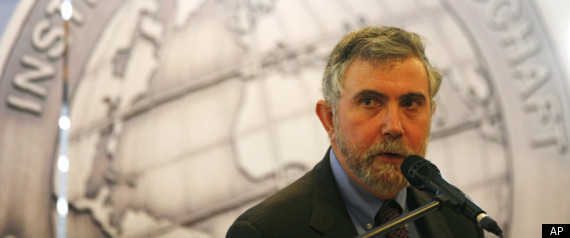 Paul Krugman, the Nobel Prize-winning Princeton economist and New York Times columnist, said Tuesday that the United States needs to spend on a scale similar to World War II in order to escape an extended economic slump.
Paul Krugman, the Nobel Prize-winning Princeton economist and New York Times columnist, said Tuesday that the United States needs to spend on a scale similar to World War II in order to escape an extended economic slump."What we need is actually the financial equivalent of war," he said during a talk at the 92nd Street Y in Manhattan. "What actually brought the Great Depression to an end was the enormous public spending program otherwise known as World War II."
World War II boosted government spending to 42 percent of total U.S. output, according to the Congressional Budget Office. Krugman said that while a fiscal stimulus program does not have to be on the scale of World War II, ideally it would involve "useful" infrastructure projects such as repairing bridges and sewer systems and building a railway tunnel between New Jersey and New York.
He said that the wars in Iraq and Afghanistan, though expensive, have not stimulated the economy because in comparison to the country's total output, "this is not big spending." The cost of the wars in Iraq and Afghanistan peaked at just 1.2 percent of GDP, while the Vietnam war was nearly twice as expensive, at 2.3 percent of U.S output, according to Bloomberg.
"We have not had the kind of aggressive policies either from the Fed or from the federal government that the depth of the crisis really calls for," Krugman said.
Krugman said he believes that the Federal Reserve should print more money to spur "above-average" inflation for five years, raising prices to bring down both unemployment and debt. The overhang of household debt has largely caused and prolonged the economic downturn, he said. The Fed's response so far has been "marginal," such as its recent decision to reshuffle $400 billion of its portfolio from short-term to long-term securities, Krugman said, since $400 billion would only make a dent in the multi-trillion-dollar U.S. bond market.
Krugman is not the only economist to advocate for inflation from the Federal Reserve to spur economic growth. Harvard economist Kenneth Rogoff has said that moderate inflation could help save the United States from a lost decade by getting rid of some household debt. Rogoff told the Boston Globe that while it would be ideal for banks to forgive the debt of some homebuyers and renegotiate the debt of others, so far largescale renegotiation has not occurred, so inflation would be the next best option to enable consumers to reemerge from a mountain of debt and start spending again.
Krugman also warned that the possible breakup of the European Union and failure of European banks could have a devastating effect on American economic recovery, similar to that of the collapse of the major Austrian bank Credit-Anstalt in 1931, which "made the Great Depression great." Now, he said, the European Union has "no safety valves" to deal effectively with the sovereign debt crisis.
Last month, Krugman said half-jokingly on a television program that the United States would be well served to prepare for a fabricated alien attack.
"If we discovered that, you know, space aliens were planning to attack and we needed a massive buildup to counter the space alien threat and really inflation and budget deficits took secondary place to that, this slump would be over in 18 months," he said.
Origin
Source: Huffington
No comments:
Post a Comment